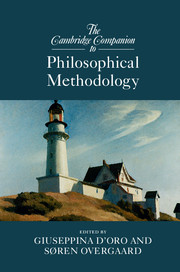
-
Select format
-
- Publisher:
- Cambridge University Press
- Publication date:
- March 2017
- February 2017
- ISBN:
- 9781316344118
- 9781107121522
- 9781107547360
- Dimensions:
- (228 x 152 mm)
- Weight & Pages:
- 0.89kg, 486 Pages
- Dimensions:
- (228 x 152 mm)
- Weight & Pages:
- 0.77kg, 482 Pages
You may already have access via personal or institutional login
Book description
The Cambridge Companion to Philosophical Methodology offers clear and comprehensive coverage of the main methodological debates and approaches within philosophy. The chapters in this volume approach the question of how to do philosophy from a wide range of perspectives, including conceptual analysis, critical theory, deconstruction, experimental philosophy, hermeneutics, Kantianism, methodological naturalism, phenomenology, and pragmatism. They explore general conceptions of philosophy, centred on the question of what the point of philosophising might be; the method of conceptual analysis and its recent naturalistic critics and competitors; perspectives from continental philosophy; and also a variety of methodological views that belong neither to the mainstream of analytic philosophy, nor to continental philosophy as commonly conceived. Together they will enable readers to grasp an unusually wide range of approaches to methodological debates in philosophy.
Reviews
'What sets this Companion apart from other recent work on philosophical methodology is its perspective. The essays in this timely volume focus on three metaphilosophical domains - conceptual analysis in analytic philosophy, Continental methodologies, and methodologies lying at the analytic/Continental divide. … This excellent resource will be valuable to those interested in either metaphilosophy overall or one particular methodology. … Summing Up: Highly recommended. Lower-division undergraduates through faculty.'
J. McBain Source: CHOICE
Contents
-
2 - Philosophy as Rational Systematization
pp 32-43 -
-
-
- You have access
- HTML
- Export citation
-
Metrics
Altmetric attention score
Full text views
Full text views help Loading metrics...
Loading metrics...
* Views captured on Cambridge Core between #date#. This data will be updated every 24 hours.
Usage data cannot currently be displayed.
Accessibility standard: Unknown
Why this information is here
This section outlines the accessibility features of this content - including support for screen readers, full keyboard navigation and high-contrast display options. This may not be relevant for you.
Accessibility Information
Accessibility compliance for the PDF of this book is currently unknown and may be updated in the future.


